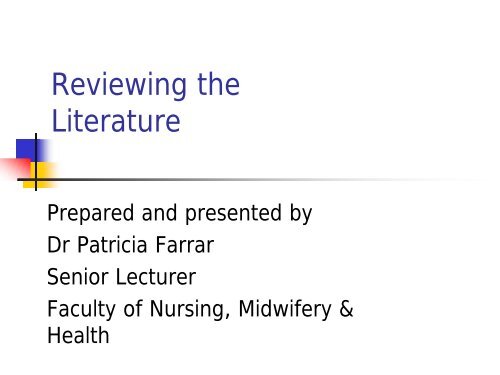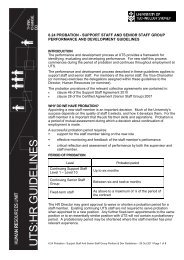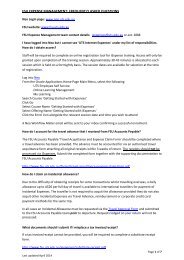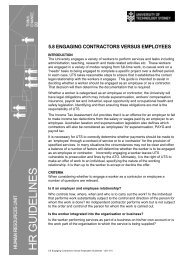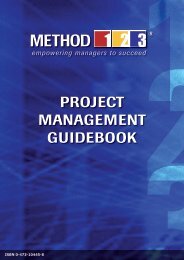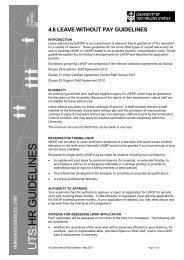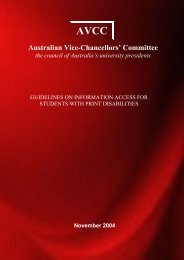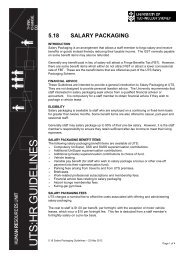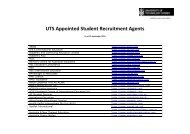Writing a literature review - Graduate Research School
Writing a literature review - Graduate Research School
Writing a literature review - Graduate Research School
Create successful ePaper yourself
Turn your PDF publications into a flip-book with our unique Google optimized e-Paper software.
Reviewing the<br />
Literature<br />
Prepared and presented by<br />
Dr Patricia Farrar<br />
Senior Lecturer<br />
Faculty of Nursing, Midwifery &<br />
Health
What is ‘the <strong>literature</strong>’<br />
• Journal articles<br />
• Books<br />
• Conference proceedings<br />
• Government publications<br />
• Theses and dissertations<br />
• Internet sources<br />
• Bibliographies
What is a <strong>literature</strong> <strong>review</strong><br />
• A conceptually organized synthesis of the<br />
results of a <strong>literature</strong> search that provides a<br />
context for your proposal or thesis<br />
• It is NOT a summary of the <strong>literature</strong>, nor<br />
merely descriptions or paraphrases of the<br />
works<br />
• It is a critical piece of discursive prose, not a<br />
list!
Why <strong>review</strong> the <strong>literature</strong><br />
• Critically examine and evaluate existing<br />
research<br />
• Show the relationship between the different<br />
studies<br />
• Locate your study within the broader<br />
research context eg method, ethical<br />
considerations
What is the purpose of a<br />
<strong>literature</strong> <strong>review</strong><br />
• To organize information and relate it to the<br />
proposal or thesis<br />
• To synthesize results of the <strong>literature</strong> search<br />
• To identify controversy in the <strong>literature</strong><br />
• To develop questions for further research
But…why do I have to write a<br />
<strong>literature</strong> <strong>review</strong><br />
• To indicate that I am knowledgeable in<br />
my field<br />
• To demonstrate to others that I have<br />
the understanding and background<br />
knowledge to undertake this project<br />
• To clarify the project for myself
When should I start the<br />
<strong>literature</strong> <strong>review</strong><br />
• As soon as you have decided on your<br />
topic and approach<br />
• While you are formulating the research<br />
question or approach to the topic<br />
• As you read the <strong>literature</strong> that you have<br />
accumulated
What skills are necessary<br />
• Information seeking<br />
• Analysis and critical appraisal<br />
• Synthesis<br />
• Evaluation
Stages in the development of a<br />
<strong>literature</strong> <strong>review</strong><br />
• Problem formulation<br />
• Literature search<br />
• Data evaluation<br />
• Analysis and interpretation
How can I organize all this<br />
information<br />
• Software eg Endnote<br />
• 4 X 3 Cards<br />
• Themes – the Kitchen Bench Method<br />
• Cut –up<br />
• The 4P Method – paper, post-it notes,<br />
paper-clips and piles
How should I organize the<br />
<strong>literature</strong><br />
• Time<br />
• Content themes or trends<br />
• <strong>Research</strong> method<br />
• Theories
How do I analyze the<br />
information<br />
•Initial appraisal<br />
• Author<br />
• Date of Publication<br />
• Edition or revision<br />
• Publisher<br />
• Journal
But wait, there’s more…<br />
analysis!<br />
• Content analysis<br />
• Intended audience<br />
• Objective reasoning<br />
• Coverage<br />
• <strong>Writing</strong> style<br />
• Evaluative <strong>review</strong>
How can I write a good<br />
<strong>literature</strong> <strong>review</strong><br />
• Remember the purpose<br />
• A context for your proposal or thesis<br />
• Read with a purpose<br />
• Summarize: concepts, similarities,<br />
differences<br />
• Write with a purpose<br />
• Demonstrate and evaluate relationships
Literature <strong>review</strong>s should contain<br />
• An overview of the subject, issue or theory<br />
under consideration<br />
• Organisation of the works under <strong>review</strong> into<br />
categories<br />
• Explanations of how each work is similar to<br />
and how it varies from the others<br />
• Conclusions as to which pieces are best
The introduction<br />
• Define or identify the general topic,<br />
issue, or area of concern<br />
• Point out overall trends, conflicts, gaps<br />
or new perspectives<br />
• Establish your position (point of view)<br />
from which you are <strong>review</strong>ing the<br />
<strong>literature</strong><br />
• State why certain <strong>literature</strong> is or is not<br />
included (scope)
The body<br />
• Group the <strong>literature</strong> according to common<br />
denominators<br />
• Summarize individual studies or articles<br />
according to its importance in the <strong>literature</strong><br />
• Provide the reader with "umbrella" sentences<br />
at beginnings of paragraphs, "signposts"<br />
throughout, and brief "so what" summary<br />
sentences
The conclusion<br />
• Summarize major contributions of<br />
significant studies with reference to the<br />
introduction<br />
• Evaluate the current "state of the art"<br />
for the body of knowledge <strong>review</strong>ed<br />
• Conclude by providing some insight into<br />
the relationship between the central<br />
topic of the <strong>literature</strong> <strong>review</strong> and a<br />
larger area of study
<strong>Writing</strong> it up –<br />
using linking words<br />
• For authors who draw similar conclusions:<br />
• also; similarly; again; in addition<br />
• For authors who complement one another:<br />
• moreover; furthermore; notwithstanding<br />
• For authors who disagree or contradict:<br />
• however; conversely; nonetheless; on the<br />
other hand
More writing up -<br />
useful verbs (adjust for case, tense,<br />
mood and voice)<br />
• When an author makes a claim:alleges;<br />
suggests; contends; argues; proposes;<br />
contests<br />
• When authors make the same claim across<br />
texts:agree; concur; support; validate;<br />
correspond with<br />
• When authors disagree: argue; refute;<br />
challenge; dispute; contradict; negate;<br />
invalidate; rebut; disprove; counter; oppose
Citing references<br />
• In text<br />
• Footnotes<br />
• Endnotes
What is a ‘good’ or ‘bad’<br />
<strong>review</strong> You choose!<br />
• Sexual harassment has many consequences. Adams,<br />
Brown and White (1998) found that some women<br />
students said that they avoided taking a class or<br />
working with certain lecturers because of risk of<br />
harassment. They also found that men and women<br />
students reacted differently. Their research was a<br />
survey of 1,000 men and women graduate and under<br />
graduate students. Benson and Thomson’s study in<br />
Social Problems (2002) lists many problems created<br />
by sexual harassment. In their excellent book, “The<br />
Lecherous Professor”, Maralyn Davis and Julie<br />
Wilson (2004) give a long list that victims have<br />
suffered.
Now rate this one!<br />
• Survivors of sexual harassment suffer a range of<br />
consequences from lowered self-esteem and selfconfidence,<br />
to withdrawal from social interaction,<br />
changed career goals and depression (Adams, Brown<br />
& White, 1998; Benson & Thomson, 2002; Davis &<br />
Wilson, 2004). For example, Adams et al (1998)<br />
noted that 13 per cent of under-graduate women<br />
students said they avoided taking a class or working<br />
with certain lecturers because of the risk of<br />
harassment. Moreover, Davis and Wilson (2004)<br />
reported that 5 per cent of female post-graduate<br />
students withdrew from their studies completely as a<br />
result of sexual harassment.


